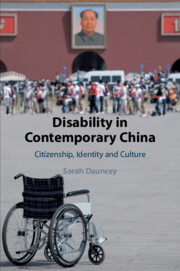Book contents
- Disability in Contemporary China
- Disability in Contemporary China
- Copyright page
- Dedication
- Contents
- Figures
- Acknowledgements
- A Note on Language
- Abbreviations
- Introduction
- 1 Where Did All the Disabled People Go?
- 2 Backstage to Centre Stage
- 3 Entertainment or Education?
- 4 A Narrative Prosthesis?
- 5 Blind, but Not in the Dark
- 6 Private Lives for Public Consumption
- Conclusion
- References
- Index
4 - A Narrative Prosthesis?
Disability and the Literary Imagination
Published online by Cambridge University Press: 18 September 2020
- Disability in Contemporary China
- Disability in Contemporary China
- Copyright page
- Dedication
- Contents
- Figures
- Acknowledgements
- A Note on Language
- Abbreviations
- Introduction
- 1 Where Did All the Disabled People Go?
- 2 Backstage to Centre Stage
- 3 Entertainment or Education?
- 4 A Narrative Prosthesis?
- 5 Blind, but Not in the Dark
- 6 Private Lives for Public Consumption
- Conclusion
- References
- Index
Summary
With the loosening of control over cultural production from 1976 onwards, authors were also freed to focus on concerns of a more social and personal nature as well as to explore the aesthetic potential of disability. In fiction, two relevant strands emerged. In the first, we see the appearance of semi-autobiographical works produced by writers with direct experience of disability, such as Shi Tiesheng (1951–2010), arguably China’s most famous disabled author. In the second, we see the rise of explicitly fictional works, exemplified by the works of two of his key contemporaries Han Shaogong (b. 1953) and Yan Lianke (b. 1958). Chapter 4 demonstrates that, while the inclusion of disability has subverted and challenged the conventions of socialist realism to reveal hopes and aspirations for enhanced inclusion and intimacy, it has more often become the ‘narrative prosthesis’ that reinforces tropes and stereotypes. Disabled people here are variously portrayed as isolated, pitiful, grotesque, sub-human even. Exposure of and violence against the female body in particular by male authors, re-establishes power relationships and offers reassurance to able-bodied male audiences of their superiority.
Keywords
- Type
- Chapter
- Information
- Disability in Contemporary ChinaCitizenship, Identity and Culture, pp. 110 - 134Publisher: Cambridge University PressPrint publication year: 2020

